PUBLISHED
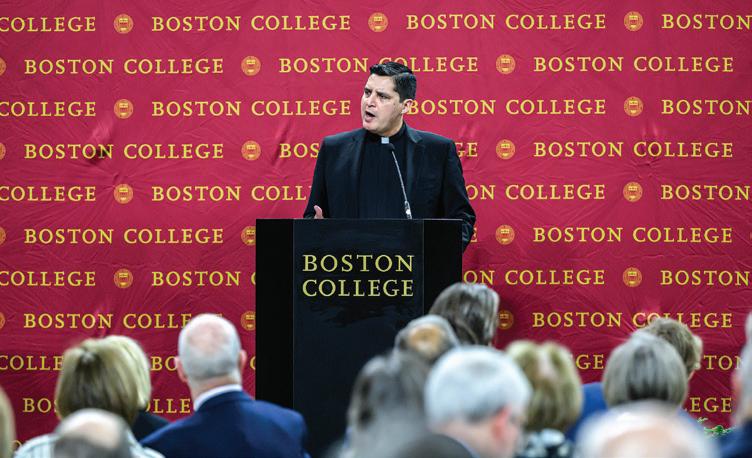
Erick Berrelleza, S.J., the founding dean of Boston College’s Messina College, was the featured speaker at the University’s annual Laetare Sunday event on March 10. Messina College is preparing to welcome its first class for the 2024-2025 academic year.
University Now Features Academic Wall of Honor
A tribute to undergraduates who have earned Rhodes, Marshall, Goldwater, and other distinguished scholarships
Boston College has created an Academic Wall of Honor in Gasson Hall to pay tribute to BC student recipients of the world’s most prestigious academic scholarships.
The Wall of Honor lists the names and graduation years of the 59 BC students who earned coveted Rhodes, Marshall, Churchill, Goldwater, and Truman scholarships during their undergraduate years. It will be updated annually to recognize future award winners.
The project was conceived by Associate Vice President for University Communications Jack Dunn as a way of recognizing the University’s most accomplished stu-
INSIDE
2 Around Campus Diversity and Inclusion Summit; Gaelic Roots ceili; Update on twostep authentication.
4 Electrochemical Labeling BC chemists develop a new catalytic process.
8 BC Research
A multidisciplinary project targets infant malnutrition.
dents for their academic achievement.
“These individuals represent Boston College at its best,” said Dunn. “Having had the pleasure of interviewing many of them during the past 25 years, I have always been impressed by their talent, leadership, and commitment to excellence. They deserve to be recognized and celebrated as examples for our current students to emulate.”
Dunn said University President William P. Leahy, S.J., and Provost and Dean of Faculties David Quigley hope the wall will encourage more students to pursue the highly competitive awards, which provide a range of opportunities, from international study at some of the world’s most distinguished universities to tuition support at undergraduate and graduate schools.
Rhodes Scholarships, awarded each year to 32 students from the United States on the basis of scholarly achievement, character, and potential for leadership, provide two or more years of fully funded graduate study at the University of Oxford.
Marshall Scholarships support two years of fully funded graduate study for up to 50 distinguished American undergraduates in any field at an educational institution in the United Kingdom.
Churchill Scholarships, which are awarded to 18 American students annually based on academic and research achieve-
Continued on page 3
Popular Majors
Holding Steady
Finance, economics, biology continue to be the top choices of Boston College undergraduates
BY SEAN SMITH CHRONICLE EDITOR
All the inspiration Carroll School of Management junior Jimmy O’Malley needed to study finance came from his parents and their entrepreneurial zeal—his father explored the restaurant business, painting, and then dog-walking, while his mother went from selling shoes online to running a private psychotherapy practice.
“Having watched my parents struggle to run their own businesses without formal accounting, finance, or marketing training, I entered Boston College hoping to get those skill sets,” he said. “Being able to help both of my parents in their respective businesses after getting more formal training in these fields has been a gratifying experience. As I looked toward my career, I knew I wanted to explore finance more, given the platform BC gave me—something neither of my parents had.”
O’Malley is among the 1,461 majors in finance, which again leads the list of BC’s most popular undergraduate fields of
study. The other nine most-enrolled majors for the 2023-2024 academic year also remain unchanged from last year: economics (1,278), biology (816), political science (691), psychology (615), communication (567), computer science (556), nursing (429), neuroscience (417), and applied psychology and human development (380).
These and other data for the University’s 9,575 undergraduate day students and 5,119 graduate students were compiled during the fall 2023 semester by the Office of Institutional Research and Planning (IR&P) as part of its yearly compendium of facts and figures for administrators, faculty, staff, and students. Current and past editions of the Boston College Fact Book are accessible at bc.edu/factbook.
(Data for economics and computer science majors reflect enrollments in both the Morrissey College of Arts and Sciences and Carroll School of Management; as of 2023, the computer science major reflects enrollments in MCAS only.)
Finance also remains far and away the
Continued on page 5
The Return of ‘Fiddle
BY ALIX HACKETT SPECIAL TO THE CHRONICLE
Growing up, Danny Gillis always looked forward to Friday nights. He’d pull on his Boston College hockey jersey, emblazoned with “Gillis” on the back, and pile into the car with his dad, mom, and older sisters. Inside Conte Forum, they’d find their usual seats—front row, right behind the net—and cheer on their beloved Eagles, ranked number one in the East.
“It was great quality time with my family and I just loved the atmosphere,” recalled Gillis, who was recently accepted into the BC Class of 2028. “Conte was always packed and it was really exciting just being there.”
One night in 2013 things got even more fun for the extroverted redhead, who loved to entertain. During the second
Continued on page 4
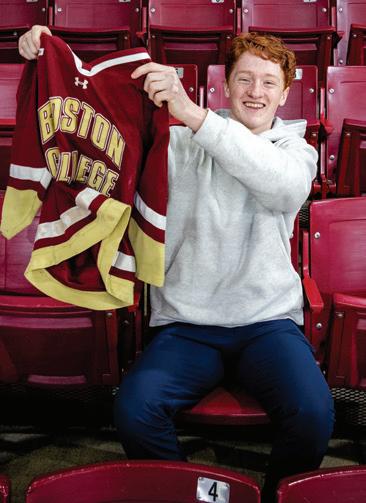
MARCH 14, 2024 VOL. 31 NO. 13
BY THE BOSTON COLLEGE OFFICE OF UNIVERSITY COMMUNICATIONS
Kid’
A Conte Forum legend is now in BC’s Class of 2028
Danny Gillis looks forward to coming to the Heights this fall as a first-year student.
photo by caitlin cunningham
photo by gretchen ertl
Around Campus
The annual Boston College Diversity and Inclusion Summit, which addresses issues related to diversity and inclusion at the University and in the field of higher education, will be held on May 22 in Gasson Hall from 9 a.m. to 4:30 pm. The event brings together administrators, faculty, and staff to learn about promoting and sustaining an inclusive environment.
Registration for the summit begins in early April. To register, go to the Office for Institutional Diversity website, bc.edu/ diversity.
“The theme for this year’s summit, ‘Belonging in Practice: Maintaining Momentum,’ is crucial as it encourages reflection and awareness of individual and
institutional roles in building, advancing, and sustaining diverse and inclusive spaces of belonging,” said Office for Institutional Diversity Associate Vice President Patricia Lowe.
This year’s event is dedicated to enhancing an understanding of practices that actively contribute to and maintain inclusive excellence, according to organizers. At Boston College, they said, creating a sense of belonging involves fostering spaces where everyone feels welcomed, valued, and empowered to be their authentic and best selves.
Attendees will reflect on actions that sustain the momentum of belonging through introspection and dialogue, to

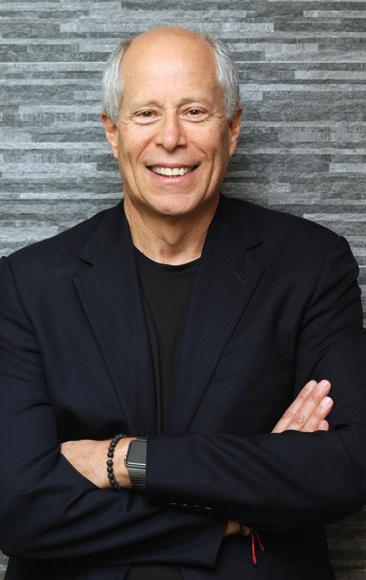
strengthen the framework that helps each community member feel a sense of belonging at the University, and supported in an environment that embraces acceptance, inclusion, and identity.
“We hope that participants will gain a deeper understanding of the mission and
Registration Starts Soon for 2024 Diversity and Inclusion Summit Change to Two-Step Authentication
Gaelic Roots’ Invitation to Dance
Audiences have enjoyed numerous performances in Boston College’s Gaelic Roots Series over the years, but they’ll be asked to do something a little different at next week’s event: get up and dance.
Gaelic Roots Director Sheila Falls Keohane will organize a traditional Irish ceili on March 22 in Gasson 100—also known, appropriately in this case, as “the Irish Room”—at 6:30 p.m. The Gaelic word “ceili” (KAY-lee) refers to a social occasion that involves participatory dancing to live music, with occasional breaks for singing or other musical performances. The Gaelic Roots ceili’s special guest will be awardwinning Boston-area Irish dance performer, teacher, and choreographer Kieran Jordan ’96, who will teach the dances. Keohane, an accomplished fiddler, will be joined by Andrew Caden ’24—who has twice com-
peted in the prestigious All-Ireland fiddle competition—and other musicians in providing accompaniment for the dances, and students from her fiddle classes at BC will perform.
“We’re delighted to have Gaelic Roots host a community event for people to participate in,” said Keohane. “Everyone is welcome and no experience is necessary. The dances will be taught and demonstrated first, then done to live music.”
Sponsored by the BC Center for Irish Programs, Gaelic Roots explores Irish, Scottish, American, and related folk music traditions through concerts, talks, and other events featuring accomplished performers widely considered among the best at their craft.
—University Communications
Beginning March 18, members of the Boston College community will see changes to the two-step authentication process used in accessing their BC-affiliated accounts on the Agora portal.
Instead of being prompted by the BCbranded verification screen, users will be introduced to the “Duo Universal Prompt” screen. The new prompt was created by Cisco Duo and is an outgrowth of Cisco Systems’ 2018 acquisition of Duo Security, which produces the access management tools used by BC.
With the new update, the system remembers the user’s last-used authentication method, streamlining the log-in process and eliminating the need for users to manually select their preferred option. Text messages sent during authentication now include only one passcode, and the URL of the web page displaying the Duo prompt
core values of cura personalis [care of the whole person] and cura apostolica [apostolic care], and the continued commitment to the greater good,” Lowe said.
Featured keynote speaker Howard J. Ross is a lifelong social justice advocate and one of the world’s seminal thought leaders in identifying and addressing unconscious bias. A speaker and author, he specializes in synthesizing neuro-cognitive and social science research and direct application regarding diversity, inclusion, equity, and accessibility work.
Ross’s client work has focused on corporate culture change, leadership development, and managing diversity. He has implemented large-scale organizational culture-change efforts in the area of managing diversity and cultural integration in academic institutions, professional services corporations, Fortune 500 companies, and retail, health care, media, and governmental institutions in 47 states across the nation and more than 40 countries worldwide. His most recent book is How Our Need to Connect is Tearing Us Apart
More information on Ross is available at his website, howardjross.com.
Related posters and exhibitions that showcase learning in action and cultivating a culture of inclusion are currently being accepted; for information on submissions, contact diversity@bc.edu.
—University Communications
has shifted to duosecurity.com.
While the new prompt will have a front face that appears different, Duo will maintain its system of managing devices at bc.edu/manage2step. For those who use the Duo Mobile App on their smartphones, no changes or updates will need to be made by the user.
“All multi-factor functions used by BC will still be there after the change, and additional features associated with the new interface may be enabled by BC in the future,” said David Escalante, director of computer security and policy.
The University’s Information Technology security team advises BC community members to be wary of any attempt to mimic the authenticating notifications of Duo’s two-step prompts. Call 617-552HELP(4357) or email security@bc.edu with any concerns or questions.
—Audrey Loyack
March 14, 2024
The Boston College Chronicle (USPS 009491), the internal newspaper for faculty and staff, is published biweekly from September to May by Boston College, with editorial offices at the Office of University Communications, 3 Lake Street, Brighton, MA 02135 (617)552-3350. Distributed free to faculty and staff offices and other locations on campus. Periodicals postage paid at Boston, MA and additional mailing offices. POSTMASTER: send address changes to The Boston College Chronicle, Office of University Communications, 3 Lake Street, Brighton, MA 02135. A flipbook edition of Chronicle is available via e-mail. Send requests to chronicle@bc.edu. ASSOCIATE VICE PRESIDENT FOR UNIVERSITY COMMUNICATIONS Jack Dunn SENIOR DIRECTOR FOR UNIVERSITY COMMUNICATIONS Patricia Delaney EDITOR Sean Smith CONTRIBUTING STAFF Phil Gloudemans Ed Hayward Audrey Loyack Rosanne Pellegrini Kathleen Sullivan PHOTOGRAPHERS Caitlin Cunningham Lee Pellegrini www.bc.edu/bcnews chronicle@bc.edu Chronicle
Diversity and Inclusion Summit keynote speaker Howard J. Ross
Kieran Jordan ’96 (center) will lead an Irish ceili in Gasson 100, as she did here in 2012.
photo by christopher huang
2 Chronicle
March 20 Symposium Will Showcase Graduate Research
More than 40 master’s and doctoral students from six Boston College schools will showcase their work at the Graduate Research Symposium on March 20 in the Heights Room of Corcoran Commons.
Graduate students from the four host schools—Connell School of Nursing, Lynch School of Education and Human Development, the Morrissey College of Arts and Sciences, and the BC School of Social Work—along with those from the Carroll School of Management, and the Woods College of Advancing Studies, will offer a 10-minute oral synopsis of their respective empirical research, followed by five minutes of audience questions, or make a brief poster presentation.
BCSSW Dean Gautam Yadama will open the convening at 8:30 a.m., followed by the poster session; oral presentations begin at 9:40 a.m., and are expected to conclude at noon. Students, faculty, and friends are invited to attend.
The symposium—a renewal of an oncampus seminar last staged more than 10 years ago—was resurrected by BCSSW Doctoral Program Assistant Director Deborah Hogan and colleagues at each of the four host schools, primarily to “infuse a sense of community among all BC graduate students who sometimes work in silos with few opportunities to celebrate each other’s work,” noted Hogan, the event coordinator.
“Our objective is to bring together the graduate student community, and to drive a sense of belonging while demonstrating support for, and the value of, each graduate
Spring Pinnacle Lecture Is March 27
Nurse, Navy veteran, and filmmaker Denetra Hampton will deliver the Connell School of Nursing’s spring Pinnacle Lecture on March 27 at 5 p.m. in the Yawkey Center Murray Room.
Hampton is the founder of For Nurses By Nurses Productions, a media platform that includes a leadership initiative, digital nursing and health science library, and film production company. Her work is focused on bridging gaps in health inequities through scientific storytelling.
Prior to her address, there will be a 4 p.m. screening of her film “The Black Angels: A Nurse’s Story,” which tells the story of Black nurses in the 1940s who risked their lives to care for patients with tuberculosis—an incurable disease at that time— after white nurses refused to do so.
Hampton’s other films include “The First Four,” about the first African American nurses to graduate from Chicago’s Provident Hospital and Training School for Nurses; “Year of the Nurse and Midwife”; “Racism in Nursing: The African American Nursing Experience”; and “The Dixie 3: A Story on Civil Rights in Nursing.”
Each semester, the Connell School invites a recognized leader to campus to speak on an issue at the forefront of health care. Hampton’s lecture and the film
student’s research,” said Hogan, who views the symposium as a crucial element in ways to enhance formation among the more than 4,000 full- and part-time graduate students enrolled in the participating schools. “It’s intentionally a very diverse group of presenters, discussing a very wide variety of academic pursuits.”
Applicants were recruited through outreach to BC’s Graduate Student Association, and online alerts and flyers to each of the schools. Over 50 submissions were received, and presenters were selected through a blind review process by faculty from the four host schools. The oral presentations are organized by category, ranging from “Safety in Healthcare” to “Technology and its Role in Communications and Learning.”
“I am thrilled to see this event taking place on our campus,” said BCSSW Doctoral Program Assistant Dean Christopher Salas-Wright, who earned a doctorate at BC in 2012, and presented several times in the earlier version of this event. “This symposium provides a great opportunity for our graduate students to share their work with others, to foster interdisciplinary connections, and to build community across campus.”
“We hope that we’ve re-launched an event that will serve as an annual validation for BC graduate students, and a rallying point for them as a collective,” said Hogan, who is also a presenter and a doctoral candidate in the Lynch School.
—Phil Gloudemans

screening are free and open to all Boston College students, faculty, staff, and alumni, as well as preceptors and practitioners.
Hampton is a former United States Naval Nurse Corps Officer who served in the Navy for 22 years. She earned a master’s in health services administration from Strayer University and a bachelor of science in nursing from Hampton University. She is a member of the American Historical Association and the Association for the Study of African American Life and History.
Hampton’s Pinnacle Lecture will be followed by an audience Q&A. To register for the event, or learn more about the lecture series, visit the Pinnacle website [bc/edu/ pinnacle].
—University Communications
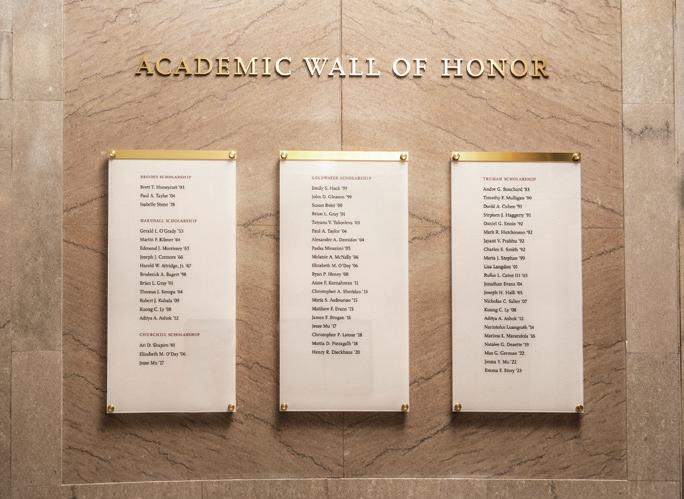
Academic Wall of Honor Now on Display in Gasson
Continued from page 1
ment in science, mathematics, and engineering, provide a year of graduate study at the University of Cambridge.
Goldwater Scholarships offer financial grants for up to two years to outstanding college sophomores and juniors who intend to pursue research careers in the natural sciences, mathematics, and engineering.
Truman Scholarships support select students who are interested in careers in public service with funding for graduate study at the college or university of their choice.
Melanie McNally ’06, who won both a Goldwater and Beckman Scholarship during her years at Boston College, said she was pleased to see the University create a space to honor its scholarship recipients, many of whom are making a difference in the world as leaders for change.
“These awards play a critical role in opening doors for students,” said McNally, a pediatric neurologist and clinician scientist at Massachusetts General Hospital. “They exposed me at a young age to what was possible and helped to launch my career as a scientist and researcher. I will always be grateful for the fellowships and to BC for giving me the opportunity to thoroughly challenge myself as an undergraduate.”
Thomas Kempa ’04, associate professor of chemistry and of materials science and engineering at Johns Hopkins University, who spent two years at Imperial College in London courtesy of a Marshall Scholarship, said the award helped to shape his career by providing an opportunity to do research
with leaders in the field of energy sustainability at such an early age.
“By giving me extreme flexibility and freedom to pivot to a new research area, the Marshall Scholarship inspired me to be bold in my future scientific pursuits and to have the courage to push boundaries,” said Kempa. “These post-graduate scholarships help young scholars to contend with tough questions regarding intellectual interests, core values, and dreams. I am very touched and honored that my alma mater has created such a tribute to student achievement.”
Quigley lauded the student recipients and credited Jason Cavallari, interim director of the University Fellowships Committee and his fellow faculty committee members for the work they do in advising students on fellowships and scholarships, which also include Fulbright Grants, Gates Cambridge Scholarships, and Gilman International Scholarships, among others.
“Boston College’s faculty is proud of our many graduates who have earned these prestigious awards, and the Academic Wall of Honor will be a powerful reminder of their legacy,” said Quigley.
“The University Fellowships Committee stands ready to support current students as they explore the many opportunities for post-graduate study and travel. I look forward to seeing the names of some current undergraduates on the wall in the not-too-distant future and for many years to come.”
—University Communications
“These post-graduate scholarships help young scholars to contend with tough questions regarding intellectual interests, core values, and dreams.”
—Thomas Kempa ’04, former Marshall Scholar
March 14, 2024
Denetra Hampton
photo by sl hampton
The newly installed Academic Wall of Honor in Gasson Hall, which lists the names and graduation years of 59 BC students who earned coveted scholarships during their undergraduate years. It will be updated annually to recognize future award winners.
3 Chronicle
photo by lee pellegrini
Jump-Starting a New Catalytic Process
Researchers use electrocatalysis for site-specific protein modification
BY ED HAYWARD STAFF WRITER
Boston College researchers have used a mild charge of electricity to precisely modify proteins—a new, and inexpensive, tool that can be used to develop novel biotherapeutics and protein-based research tools.
Led by Chemistry Professors Abhishek Chatterjee and Eranthie Weerapana, the team developed and optimized a novel electrochemical protein labeling reaction called “eCLIC”, that enables precise modification of site-specifically incorporated 5-hydroxytryptophan (5HTP) residues on many different proteins including full-length therapeutic antibodies.
“We used this strategy to generate many site-specific protein conjugates, including an antibody-cytotoxic drug conjugate that selectively enters and kills cancer cells, but not non-cancer cells,” said Chatterjee. “A key advantage of eCLIC is the reagents needed for this method are really inexpensive, costing less than $10 a gram.”
The team’s success marked the first time electrocatalysis has been used to achieve protein modification in a site-specific manner, they reported in an article published in the journal Nature Chemistry, “Electrochemical labeling of hydroxyindoles with chemoselectivity for site-specific protein bioconjugation.”
Proteins are large molecules, typically composed of hundreds of amino acid monomers, Chatterjee noted. The ability to selectively modify proteins at predefined sites is important for many applications.
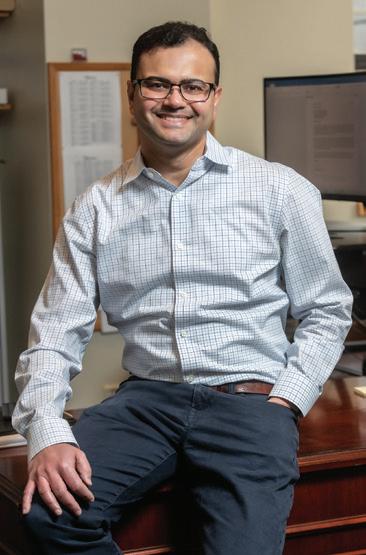
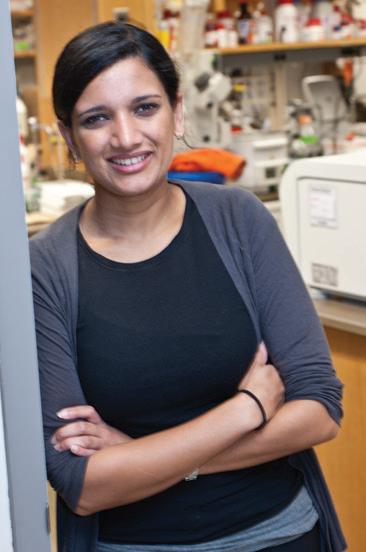
site. In particular, we were interested in developing a reaction that would use electricity to catalyze the protein modification reaction, instead of chemical catalysis, since the former is inexpensive, environmentally friendly, and gentle on delicate proteins.”
Chatterjee said the team was able to overcome an unusual challenge when they first tried to model the reaction. Typically, researchers start with small molecules, in this case 5HTP and aniline, then move on to large proteins.
But first attempts at the reaction between 5HTP and anilines at the smallmolecule level were messy, as the 5HTP molecules reacted preferentially with each other. When 5HTP was incorporated into a large protein, however, it was no longer able to react with another protein-bound 5HTP, and cleanly reacted with an aniline instead, the team reported.
For example, by covalently attaching toxic drugs to antibodies, it has been possible to selectively deliver them to cancer cells, resulting in both improved therapeutic efficacy and reduced off-target toxicity.
Many research applications also require the attachment of biophysical probes onto various proteins. The ability to define the site of modification on proteins is critical to ensure that important protein functions are not harmed, Chatterjee said.
“The challenge arises from the fact that all proteins are made from 20 amino acids in various combinations,” he said. “Identifying a modifiable functionality at the desired site, not repeated elsewhere, is typically challenging, which makes it dif-
‘Fiddle Kid’ a Future Freshman
Continued from page 1
intermission, “The Devil Went Down to Georgia” began blaring over the speakers— a rollicking folk ballad with a famous fiddle solo—and the camera homed in on a student fiddling away on an imaginary instrument. The next week, the camera crew played the footage on the jumbotron and found the student in the audience. A new BC tradition was born, and Gillis wanted to be part of it, so the next time the song played, his father encouraged him to give air fiddling a try.
“The camera is right behind the net, and everyone thought it was hilarious when I was up there—a seven-year-old kid playing the fiddle in the jersey,” said Gillis. “From that point forward, I would just be waiting for second intermission to do the air fiddle. It was always so exciting hearing the roar of the students.”
Gillis was an instant fan favorite. When he left his seat to get snacks, students would stop him for autographs (“I had just learned cursive”) or selfies, posting excitedly on social media about their run-in with the “Fiddle Kid.” He was recognized every-
where, including on a trip to Paris with his family, where a group of students studying abroad approached him in front of the Arc de Triomphe. One student even dressed up as Gillis for Halloween, donning a red wig and carrying a tiny fiddle.
On the way to the Beanpot in 2014, Gillis’s sisters, who both attended BC, started a Twitter account for the BC Fiddle Kid. By the end of the game, which BC won 4-1 against Northeastern, the account had more than 500 followers. Later that season, someone tweeted “If @bcfiddlekid doesn’t end up at BC, Eagles everywhere will cry.”
From a young age, Gillis knew he wanted to attend BC, partly because it ran in his family: in addition to his sisters, his great-grandfather and grandfather attended Boston College, as did his father and uncle, who both played for the hockey team (his other uncle, considered the best hockey player in the family, passed away his freshman year at BC). In seventh grade, Gillis enrolled at a new school and began taking academics more seriously, while still spend-
ficult to achieve site-specificity in protein modification.”
To overcome these challenges, the team sought to develop a method to incorporate a non-natural amino acid at any chosen site or sites of a protein. The team accomplished this by reengineering the translation system of cells to accommodate the new amino acid 5HTP.
In addition, the researchers wanted to design chemical reactions that could be used to selectively modify this nonnatural amino acid in the presence of all of the natural amino acids, Chatterjee said.
“If we could do this, we could provide a general method to generate proteins with a built-in ‘attachment-handle’ at a predefined
“If we had stuck with the traditional progression—from small to large—we’d have never pursued eCLIC, thinking ‘It’s too messy,’” Chatterjee said. “Instead, we did our reaction development nontraditionally, directly on a protein, which helped us realize how clean and selective it was in this setting.”
To further advance the eCLIC strategy for large-scale modification of important protein targets, this technology has been licensed to BrickBio Inc., which Chatterjee co-founded. Future research will focus on developing next-generation, site-specifically modified protein-based biotherapeutics and research reagents.
In addition to Chatterjee and Weerapana, co-authors of the paper were postdoctoral researchers Soumya Jyoti, Atanu Mondal, and Singha Roy, and graduate students Conor Loynd, Vincent J. Ovalle, Sarah E. Canarelli, Delilah Jewel, and Elise D. Ficaretta.

ing his weekends with friends at Conte Forum or Alumni Stadium, depending on the season.
“When I got accepted, I was just humbled,” he said. “Boston College was a big part of my childhood and it’s like a second home. Now I’m going to get to experience it in such a fun new way as a student.”
Gillis and his sisters shared the happy news on the @bcfiddlekid Twitter account, which they hadn’t logged into since 2017, and congratulatory messages from former
students poured in. Although they hadn’t thought about him in a decade, many remembered the happy smiling kid fiddling away in the stands, bringing joy to everyone around him.
“It was good clean fun,” said Gillis, laughing. “I think I knew it was special, even back then, so I tried to cherish it as much as I could.”
Alix Hackett is a senior digital content writer in the Office of University Communications
March 14, 2024
Danny “Fiddle Kid” Gillis with an admirer during a BC hockey game at Conte Forum in 2014.
video capture
The work by Chemistry Professors Abhishek Chatterjee and Eranthie Weerapana with a novel electrochemical protein could have implications for targeting cancer cells.
4 Chronicle
photos by lee pellegrini
Trends Among BC’s Popular Majors Hold Steady
Continued from page 1
most popular undergraduate minor at BC, with 606 enrollees. The other top minors are marketing (298), management and leadership (285), Managing for Social Impact and the Public Good (204), philosophy (157), history (131), computer science (117), Global Public Health and the Common Good (106), English (105), and accounting for finance and consulting (104). Those enrollment figures do not include pre-dental, pre-law, pre-medical, or pre-veterinary programs of study.
BC administrators and faculty typically regard popular majors and related statistics as offering insights into BC students’ interests, motivations, and aspirations, and how these may evolve or remain constant over time. The data also provide a means to consider BC students’ academic and career interests among wider societal and generational trends: Studies in or related to business, nursing, psychology, biology, economics, computer science, communication, and political science tend to be highly enrolled throughout American higher education. However, say administrators and faculty, it’s instructive to view BC’s numbers in the context of a major national Jesuit, Catholic university and the students it attracts.
“While the increase in the numbers of finance majors and minors is consistent with an overall trend we observe across undergraduate programs in the country, there are a number of additional factors I believe significantly contribute to the success of the program,” said Haub Family Professor Ronnie Sadka, the finance chair.
“The department and school have invested significant efforts in hiring exceptional academic talent across ranks, further improving the quality of our teaching and research. The curriculum is consistently reviewed and adapted to account for new developments in financial markets as well as student feedback. Finally, we improved the accessibility of our classes to welcome students across the University.
“We are grateful to BC senior leadership for the opportunity to participate in the
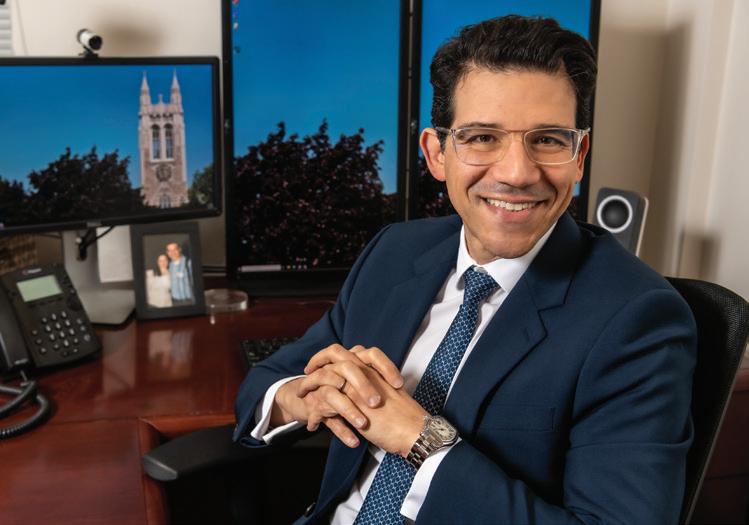
educational experience of the students and improve their attractiveness upon graduation.”
As a finance major, O’Malley opted to focus on investment banking and private equity, and spent a considerable amount of time beyond his classroom experience as a sophomore preparing for interviews. He will work this summer as an analyst at Blackstone. “I am extremely grateful for this opportunity, which would not have been possible without the incredible teachers, junior and senior mentors, and alumni who helped me navigate the process.”
Gratitude also is evident in 2018 alumna Gabrielle LeBlanc’s assessment of her experience as a BC finance major. More than a set of required courses, she said, the program is “a holistic approach to navigating the world of finance,” where “excellent faculty and a robust network of alumni” help guide students toward internship and career opportunities.
“The program is first-rate, and the curriculum taught me how to think critically in the world of business and finance,” said LeBlanc, a vice president in the equity capital markets group within the Barclays Investment Banking Division. “What truly differentiates finance at BC is the people, from the professors to the career advisors to the students. The individuals that you meet and work with in the classroom set you up for success over the long term.”
Environmental Studies majors number far less—105—than those in finance, but the program has seen a 600 percent jump in enrollments since it was introduced as a major in 2014, the most such increase of any during the past decade. Professor of the Practice Tara Pisani Gareau, the program’s director, attributes its popularity to students’ concern about the multitude of environmental challenges, from violent storms and catastrophic wildfires to loss of freshwater resources and failing crop yields.
“When we ask graduating seniors their
and economically secure—is Environmental Studies’ secret sauce that makes students, alumni, and faculty feel connected to one another and to something larger than themselves,” said Gareau. “Students value the diversity of meaningful experiences we provide or promote that shape their experience at BC and help them to discern a pathway for life after college.”
Managing for Social Impact (MSI) has quickly become a popular minor since the program debuted in the fall of 2016: This year’s 204 enrollees are more than double the 97 MSI minors in 2020-2021. CSOM Senior Associate Dean for Undergraduates Ethan Sullivan, the MSI interim director, said MSI is a natural fit for undergraduates seeking to address compelling social justice issues; about half of the enrollees are CSOM students motivated by the school’s Portico program to explore topics such as economic disparity, sustainability, innovation, and ethics.
primary reason for choosing Environmental Studies, the most common answer is that they are passionate about solving these complex and existential environmental problems,” said Gareau. “This is a watershed moment in human history and the Environmental Studies program prepares students with the knowledge and skills to envision and enact positive and lasting solutions that sustain people and the planet.”
Environmental Studies majors also appreciate the program’s interdisciplinary curriculum, added Gareau, quoting a student who described environmental issues as going beyond science and policy to include sociology, politics, ecology, geology, and psychology—all of which interested the student.
“Shared purpose—to transform society to be ecologically regenerative, socially just,
“It offers students a chance to blend elective courses—more than 200 of them— from throughout the University in really interesting combinations,” said Sullivan, who credits Carroll School Professor Emeritus Mary Cronin for conceiving MSI. “The ability to explore new options and design their own minor presents such appealing choices and a ton of freedom in the design.”
Undergraduates see MSI as a potential path to opportunities in non-profits and companies with social-impact missions, or jobs connected to a social-impact initiative such as a foundation for social responsibility within a bank or insurance company, according to Sullivan. Others may simply want to incorporate what they learned through MSI into their personal lives through participation in volunteer activities or local politics, perhaps with the eventual goal of a second job or career.
“Whether or not that always happens, we are helping to form great citizens with a mindset to solve problems,” he said.
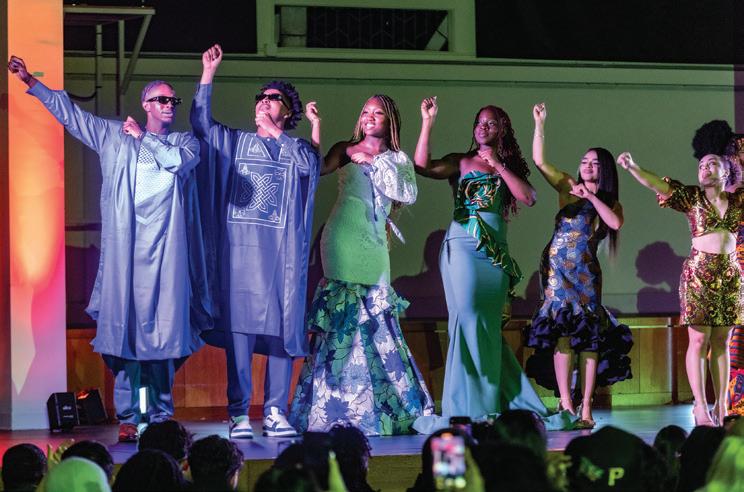
March 14, 2024
POPULAR MAJORS 1 Finance 2 Economics 3 Biology 4 Political Science 5 Psychology 6 Communication 7 Computer Science 8 Nursing 9 Neuroscience 10 Applied Psychology & Human Development
Haub Family Professor Ronnie Sadka cites several factors for the continuing popularity of finance among undergraduates, including an investment in “significant efforts to hire exceptional academic talent across ranks, further improving the quality of our teaching and research.”
photo by lee pellegrini
Snapshot ASO Looks at the Future photo by lee pellegrini
The African Student Organization recently held its annual fashion show at 300 Hammond Pond Parkway. This year’s event was titled, “Envision the African Future...”
5 Chronicle
Clough School to Recognize Young Alumni Leadership
The Gloria L. and Charles I. Clough School of Theology and Ministry will present its inaugural Young Alumni Leadership in Ministry Award next week to 2016 graduate Anna Robertson, director of distributed organizing for Discerning Deacons, a grass-roots organization whose mission is to engage Catholics in the active discernment of women in the diaconate.
Robertson will be honored on March 23 at CSTM’s 22nd annual Evelyn Underhill Lecture in Christian Spirituality, which takes place at 10 a.m. in Gasson 100. Associate Professor of Theology Brian Robinette will offer the lecture prior to the award presentation.
The newly established award honors a young graduate of CSTM who is demonstrating outstanding leadership in their field, and celebrates the ways they live out the Jesuit mission of the CSTM to be persons for and with others. Those selected exemplify what the CSTM stands for: creativity, commitment, pastoral outreach, and theological acumen. A model for their peers and current CSTM students, the honoree shows a commitment to the field of ministry and an ability to meet the changing needs of their community.
Robertson graduated from the school

Park Street Series Will Host Two Campus Talks
Two prominent scholars will give presentations at Boston College in this semester’s Park Street Corporation Speaker Series in Health, Humanities, and Ethics, which features experts in medicine, health care, and other related fields speaking on issues of values and ethics related to health and health care practices.
On March 21, Susan Burch, Middlebury College professor of American studies and a former director of its Center for the Comparative Study of Race and Ethnicity, will speak on the topic “Committed: Native Kinship, Institutionalizations, and Remembering.”
with a master’s degree in theological studies. According to the award selection committee, she has “embodied the mission of the CSTM in her work and ministry with Discerning Deacons and in her previous work as director of youth and young adult mobilization at Catholic Climate Covenant and as a campus minister for retreats at Seattle University. She has been involved in various ministerial experiences in the fields of prison ministry, hospital chaplaincy, and international immersions.
“Robertson is committed to accompanying others on their journey and honoring their stories as they work together for justice. The good work that she is doing in her many ministries will have last positive effects in the Church and the world.”
—University Communications

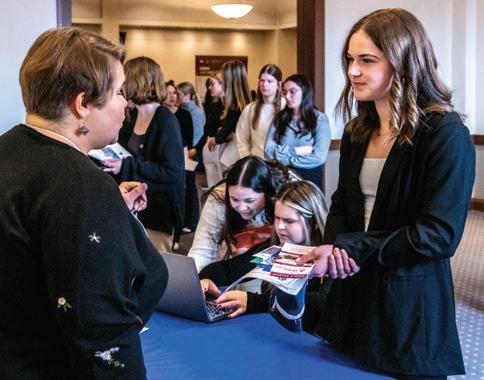
Burch’s research and teaching interests focus on the overlaps of deaf, disability, race, Indigeneity, and gender and sexuality in late 19th- and 20-century United States history. Her most recent work, Committed: Remembering Native Kinship in and beyond Institutions, centers on peoples’ experiences inside and outside the Canton Asylum, a federal psychiatric institution created specifically to detain American Indians.
Co-founder of the Disability History Association and a former board member of the Society for Disability Studies, Burch also has coedited several anthologies and served as editor-in-chief of The Encyclopedia of American Disability History.
On April 11, John Beshears, the Albert J. Weatherhead Jr. Professor of Business Administration in the Negotiation, Organizations & Markets Unit at Harvard Business School, will present “Choice Architecture Technique for Influencing Health Decisions.”
With a primary research area in behavioral economics, Beshears focuses on understanding how the financial decisions of households and firms are influenced by the
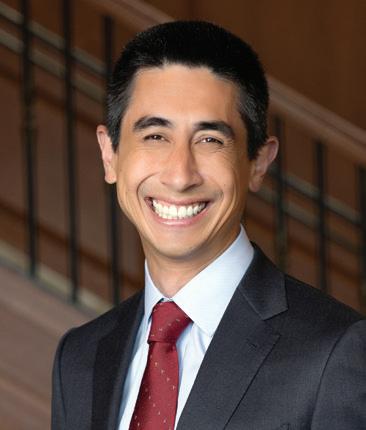
institutional environment in which choices are made. He has studied participation in retirement savings plans, household investment decisions, and health-care choices. A research associate at the National Bureau of Economic Research, Beshears received support from the National Institutes of Health and National Science Foundation, among others, and published his work in prominent journals and periodicals including the Journal of Finance, Journal of Financial Economics, and Review of Financial Studies
Both events, which are free and open to the public, will be held at 7 p.m. in Gasson 100.
Established in 2016, the Park Street Corporation Speaker Series is sponsored by the Park Street Corporation and the Boston College Institute for the Liberal Arts. For more about the series, see bc.edu/bc-web/ schools/mcas/sites/park-street-series.html.
—University Communications
Memorial Event for Dr. von Henneberg Is Set for March 25
A memorial for the late Boston College Professor Emerita Josephine von Henneberg, an accomplished scholar who played a key role in establishing BC’s art history major, will be held on March 25 at 3 p.m. in Gasson 100.
A highly regarded art history faculty member for nearly 40 years, Dr. von Henneberg is lauded by colleagues as a trailblazer at the University who was instrumental in bringing the study and teaching of art history to BC. She joined what was then BC’s Fine Arts Department in 1963, and retired in 2001.
is sponsored by the Art, Art History, and Film Department and the family of Dr. von Henneberg; a reception will follow.
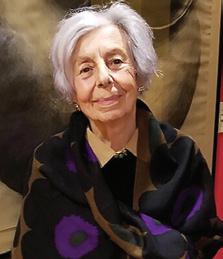
A native of Rome and an expert on European Renaissance and Baroque architectural history, she is remembered as an extraordinary scholar, colleague, and mentor. Dr. von Henneberg died last November 16 at the age of 94. [Read the full obituary for Dr. von Henneberg at rb.gy/6tqp0r]
All are welcome to the memorial, which
On March 26, the Annual Josephine von Henneberg Lecture in Italian Art—an endowed series established by Dr. von Henneberg upon her retirement—will feature University of Notre Dame Assistant Professor Marius Hauknes, an expert in the art of the Middle Ages, whose primary research focuses on the intersections of art, science, mythology, and theology. He will speak on “Art and Knowledge in Medieval Rome” in the Hill Family Room of 2101 Commonwealth, adjacent to the McMullen Museum of Art. Also sponsored by the Art, Art History, and Film Department, the public event will run from 5:30 p.m. to 7 p.m., and conclude with a reception.
For information on the memorial and lecture, see events.bc.edu.
—University Communications
March 14, 2024
photo by susan young
John Beshears
Anna Robertson will receive the Clough School of Theology and Ministry’s first Young Alumni Leadership in Ministry Award.
BC Scenes Making Connections
photos by lee pellegrini
discuss
career options at such recent campus gatherings
Wall Street
6 Chronicle
Boston College students had opportunities
to consider and
possible
as the
Network-
ing Event (above) and the Nursing, Health, and Nonprofits Career Fair, both of which took place in the Heights Room of Corcoran Commons.
Grounded
The Troubles. A controversial ‘Star Trek’ episode. BC’s Robert Savage explains the connection.
Professor of the Practice in History
Robert Savage is a widely acknowledged and quoted expert on the British media’s coverage of “the Troubles,” the three-decade Northern Irish political and sectarian conflict. But earlier this month, Savage was asked by the BBC to comment on an unusual flashpoint in the Troubles—one that involved iconic science fiction TV series “Star Trek: The Next Generation,” set in the 24th century.
A member of the Irish Studies faculty, Savage recounts in his book Northern Ireland, the BBC, and Censorship in Thatcher’s Britain how the British government under Prime Minister Margaret Thatcher sought to censor broadcast media coverage of the Northern Irish conflict in the late 1980s and early 1990s. For example, because outlets were forbidden to air direct statements by representatives of political parties that supported violence, the BBC hired actors to dub in voiceovers for footage of excluded political figures, such as those from the Irish nationalist party Sinn Féin.
The policy wound up affecting not just news but entertainment—specifically the “Star Trek: Next Generation” 1990 episode “The High Ground.” In one scene, Enterprise Captain Jean-Luc Picard and Lieutenant Commander Data (a synthetic being who continually seeks to understand human behavior) discuss whether terrorism is an effective means to promote change. When Picard says he is dubious that “political power flows from the barrel of a gun,” Data cites examples from history where such tactics were successful, including “the Irish unification of 2024.”
The question of whether Northern Ireland might, or should, someday reunite with the Irish Republic has long been a contentious issue, especially so during the Troubles. Hence, during the series’ initial run the in U.K. and Ireland, the BBC did not air “The High Ground.” Although the satellite channel Sky One broadcast the episode, the scene with Picard and Data was edited out.
“The High Ground” was finally shown unedited in 2006 on Sky One, and almost a year later on BBC.
BBC News reporter Michael Shells McNamee revisited the “High Ground” controversy in the wake of Northern Ireland’s recent elections, which saw Sinn Féin become the dominant party in the North’s government and First Minister Michelle O’Neill, the party leader, predict a referendum on Irish unity within a decade—close to, if not exactly matching, the historical milestone mentioned by Data, though current polling suggests Northern Irish voters do not support unification.
Meanwhile, noted McNamee, “On social media, people have been sharing screenshots of Data’s prediction and drawing links to Sinn Féin’s electoral success.”
Interviewed by McNamee, Savage said, “It was amazing [‘The High Ground’] was censored.” The argument Data presents to Picard, he said, “is basically just, does
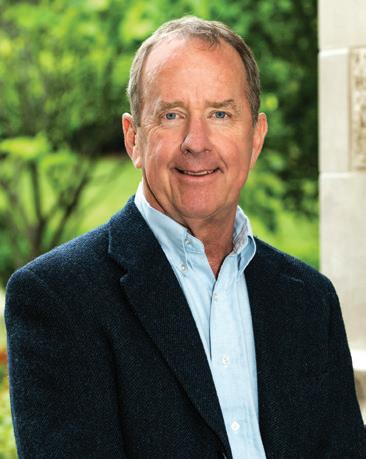 Robert Savage
Robert Savage
terrorism work? If you’ve tried every other avenue to try to effect change, is it acceptable to use terrorism? And it’s a very human question. But Picard doesn’t answer the question!”
That ambiguity, said Savage, “would have unsettled somebody like Thatcher,” who had a strong mistrust of a media—in particular the BBC—she saw as opposed, if not downright hostile, to her interests and policies including those related to the Troubles.
In a conversation last week with Chronicle, Savage said the BBC had practiced informal self-censorship long before Thatcher. Afraid of roiling Unionists in Belfast and their supporters in London, the BBC for many years avoided reporting acts of discrimination against Catholics in Northern Ireland, or even any suggestion that the region was Irish. When the Troubles began, however, BBC journalists and editors did their best to give an objective picture of what was happening—which put them at cross purposes with management.
“The decision to censor the ‘Star Trek’ episode underscores how senior BBC managers were afraid of provoking controversy,” he said. “One of the reasons the series became popular was that it often addressed the challenges that confront contemporary society. It could be cerebral and philosophical in addressing tough issues, including war and terrorism.
“Today, the question Data asks Captain Picard remains relevant—especially now that Sinn Féin, the political party that embraced the IRA’s ‘armed struggle’ and was silenced by Thatcher in 1988, is the largest political party in both Northern Ireland and the Republic of Ireland.”
Among other responses Savage has received to his BBC interview, one suggested censorship was critical to a democracy under threat; another asked if he was defending change through a barrel of a gun. But most have been very positive, he said: “One person asked if I would write about ‘Star Trek’ in my next book.”
—Sean Smith
BC in the Media
Conflicts have led to millions of children losing family members, fleeing their homes, and being caught up in the fighting themselves. Salem Professor in Global Practice Theresa Betancourt, director of the Boston College School of Social Work Research Program on Children and Adversity, discussed the impact with BBC.com.
Despite inflation slowing down, food prices continue to increase. Murray and Monti Professor of Economics Peter Ireland offered his insights on the trend to CBS Boston.
In his keynote address at the World Universities Summit in India, Lynch School of Education and Human Development Professor Emeritus Philip Altbach spoke on how multiple challenges will affect higher education internationalization. His talk was covered by The Statesman, Indian Economic Observer, and Press Trust of India
Prof. Brian Quinn (Law) spoke with The New York Times, The Guardian (U.K.), and Reuters about Elon Musk’s lawsuit against OpenAI and chief executive Sam Altman for breach of contract for putting profit ahead of the public good. He also discussed Musk’s plan to join his own startup xAI with his social media platform X in an interview with The Wall Street Journal.
David S. Nelson Chair Brian Smith, associate dean for research at the Lynch School of Education and Human Development,
Jobs
The following are among the recent positions posted by the Department of Human Resources. For more information on employment opportunities at Boston College, see www.bc.edu/jobs or scan the QR code at right.
Director, Formacion Continua Service Center Representative
Senior Unix Systems Administrator
Information Systems Manager, Sponsored Programs
Theater Promotions & Operations Assistant
Food Service Worker
Fiscal and Events Specialist
Assistant Director, Finance and Operations
Public Safety Dispatcher
Regional Director, Major Giving (Northeast)
Academic Support Assistant
Associate Dean for Academic Affairs
Utility Worker
Assistant Director, Engineering Instructional Labs
Construction Project Manager
offered comments to The Boston Globe on the use of specially trained AI-powered digital assistants to help college students with coursework.
Schiller Institute for Integrated Science and Society Professor Yi Ming (Earth and Environmental Sciences) discussed the current state of climate change, COP28, and more as a guest on the podcast Gentlemen’s Disagreement.
In an op-ed for The Wall Street Journal, Prof. Jonathan Laurence (Political Science) wrote that a Vatican City-style arrangement for Al-Aqsa could stave off Iranian aggression.
Hillenbrand Family Faculty Fellow Prof. Samuel Hartzmark (CSOM) spoke with Marketplace Radio on the decision by two financial firms to pull back on commitments related to a climate change initiative.
Assoc. Prof. of the Practice Matt Rutledge (Economics), a fellow at the Center for Retirement Research, provided insights in a Q&A with MoneyGeek on when to collect Social Security benefits and other aspects of retirement planning.
Microplastics reportedly have been detected in breast milk; plastic containers have been linked to pre-term births. Global Public Health Program Director Philip Landrigan, M.D., offered comments on the findings to The Washington Post and USA Today

Patrol Officer
Second Cook
Associate Director, Student Financial Systems
Senior Employee Relations Officer
Consulting Dietician, Pediatrics
Concessions Stand Manager
Academic Support Assistant
Research Data Consultant
Senior Business Systems Analyst
Assistant Director, Residential Life
Postdoctoral Research Fellow (multiple positions)
March 14, 2024
7 Chronicle
photo by lee pellegrini
BC Research
Across the Disciplines
Engineering, Nursing, and Computer Science faculty and students team up for a project that could aid the battle against infant malnutrition
BY SEAN SMITH CHRONICLE EDITOR
Infant malnutrition is a threat the world over, affecting all genders, races, and social statuses. Even those who survive are still at high risk for reduced physical and cognitive development, capacity to resist disease, and ability to carry out physical work, and study and progress in school.
But a project led by an interdisciplinary trio of Boston College researchers could help make a difference in the global struggle against infant malnutrition.
Supported by a grant from the BC Schiller Institute for Integrated Science and Society, Assistant Professor of Engineering Bryan Ranger, Assistant Professor of Computer Science Donglai Wei, and Connell School of Nursing Associate Professor Jinhee Park are conducting a pilot study in which frontline health care workers utilize a portable ultrasound scanner to collect images of muscle and fat distributions on infants suffering from malnutrition. The goal of the project is to develop artificial intelligence (AI) to interpret this data as it relates to nutritional status and ultimately assist with clinical decision making. The BC faculty members are collaborating with investigators from Brigham and Women’s Hospital in Boston and Jimma University in Ethiopia.
Last fall, Ranger received an Award for Inclusion Research from Google, which supports academic research in computing and technology that addresses the needs of historically marginalized groups globally;
“I believe Bryan’s work will address critical issues by creating a low-cost, portable assessment tool that provides an accurate and comprehensive child’s growth and nutritional status,” says CSON Associate Professor Jinhee Park.
the award will fund broader ongoing work on AI-enabled portable ultrasound for health care workers in Ethiopia.
A major obstacle in dealing with malnutrition cases—especially in poor, lowresourced areas—is the lack of data that can provide a fuller evaluation of a patient’s condition, note the researchers.

was drawn to the emphasis on a humancentered approach to solving global health challenges. I really value the opportunity to work with people who see the possibilities in putting knowledge and skills together, even if they come from seemingly disparate areas.”
Park said it is “a privilege” to be part of the team and share her acumen as a nurse “while developing a tool that has the potential to solve the many challenges we face. Interdisciplinary collaborations allow us to leverage the expertise of different professions to address health care challenges. As part of the largest group of health care providers in the country, nurses use more medical devices than any other health care professional and can provide unique insight on developing and designing medical products.”
“Nutritional screening tools cannot be reproduced adequately, nor do they show agreement with one another, or validity in identifying malnutrition,” explained Ranger. “Although one can use scales and tape measures to obtain anthropometric indicators such as weight, height, and body mass index (BMI), these do not effectively provide a comprehensive assessment of healthy growth and development. More advanced methods are expensive and only available in specialized facilities.”
Low-cost ultrasound technology and devices are available on the market, but require expertise to use, he said: “You can’t just give them to a health care professional in a low-resourced area and expect to solve the problem.” A scanner attached to a tablet and enhanced by AI, however, can help workers—with some initial instruction—in interpreting the data collected from patients.
“I believe Bryan’s work will address critical issues by creating a low-cost, portable assessment tool that provides an accurate and comprehensive child’s growth and nutritional status,” said Park. “If successful, this tool would help frontline health care providers to identify and treat malnutrition in infants and children, particularly in lowincome communities.”
Last summer, Ranger, Connell School graduate students Marisa Albert and Jini Kim, and junior engineering major Hayoung Cho spent time at Jimma University, observing and training local health care workers to use the portable scanners as part of the pilot study. Jimma was selected for the project because it has a well-established nutritional research program and is one of the few sites in Africa that has the specialized equipment to take nutritional data,
said Ranger. “This is where the ‘inclusion’ aspect of the Google grant is relevant,” he said. “We want to be inclusive about the data we’re collecting. Developing a tool in Boston and then deploying it somewhere completely different doesn’t make sense. Our research collaborators at Jimma bring a valuable perspective and needed expertise to the project.”
The merits of interdisciplinary collaboration are apparent in this joint venture. Ranger, who earned a doctorate in medical engineering and medical physics through the Harvard-MIT Program in Health Sciences and Technology as a National Science Foundation Graduate Research Fellow, brought a strong background in global health to BC from working with the Bill and Melinda Gates Foundation. But he felt that insights from other fields would help realize this new utilization of portable ultrasound scanners.
A conversation with Connell School Dean Katherine Gregory—Ranger has a courtesy appointment at CSON—led him to contact Park, an expert in neonatal nursing whose research focuses on health and developmental outcomes of infants and young children with feeding problems as well as those of their families. He also got in touch with Wei, who studies the interplay between biological sciences and computer vision and is experienced in building computational models for biomedical image analysis.
“Coming to BC, and helping build a new department, has been a great experience,” said Ranger, one of the first faculty hires in BC’s Human-Centered Engineering program. “In addition to the interdisciplinary aspects of the program, I
Wei, whose research lies in the domain of “AI for science,” has published works with biologists, clinicians, mechanical engineers, and civil engineers. “What appeals to me about interdisciplinary collaborations most is making a real-world impact with AI technology and the opportunities to formulate new problems for the AI field to solve.”
Albert and Kim appreciated the chance to be involved in the development of cutting-edge research, and to get a first-hand look at health care in a setting vastly different from those in which they’d worked.
“Not only did we have the opportunity to provide educational sessions of the ultrasound technology to the staff there, but we also had the chance to spend time in the hospital setting,” said Albert. “There are not enough words to express how much health care needs exist and it was a challenge to see things and know there is so much more that needs to be done beyond the scope of our work.”
Kim said, “This project serves as an exemplary illustration of how technology can be leveraged to provide more equitable and preventative care to patients, potentially fostering long-term impacts in health care. We not only identify implications for future studies but also recognize potential gaps that we can address throughout the course of the study. This helps refine the best interventional techniques for optimal result measurements when collecting different body components.”
Cho said her most vivid memories of the visit to Jimma include accompanying a nurse to observe patients; the sight of young mothers, families, and slim children in small, crowded rooms; and walls that displayed the number of children who had died each day (“I watched as the weekly and monthly count increased”).
“These experiences fueled my hunger to devote my purpose to continuing research on advancing affordable, standardized early detection and diagnostic tools,” she said.
March 14, 2024
Assistant Professor of Engineering Bryan Ranger working in his lab with Connell School of Nursing graduate students Marisa Albert, center, and Jini Kim.
photo by caitlin cunningham
8 Chronicle

















 Robert Savage
Robert Savage

